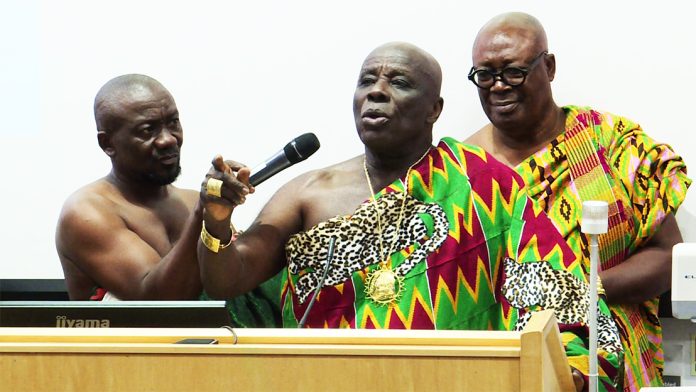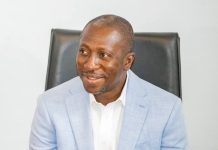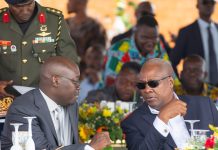The Okyenhene Osagyefuo Amoatia Ofori Panin says world leaders and the Western economies cannot be exonerated in the complicity of corruption on the African continent. He said some actions and inactions of the western leaders contribute to the menace of corruption in Africa.
The Okyenhene mentioned that the world leaders have made their countries a safe haven for corrupt politicians and African leaders to hide and enjoy their stolen wealth.
“If I walk to the bank today to deposit $15,000, the teller will take the money and report to the bank manager. The bank manager will invite me and inquire the sources of that money. But the African leaders have their own way to deposit huge monies in foreign banks without facing probes. Why must it be so?” Osagyefuo questioned.
Delivering a lecture under the theme: ‘Sustainable Leadership in African Governance’ at the School of Management, University of Bradford, in the UK, Okyenhene hinted that many African leaders and politicians have their way of depositing huge amounts in foreign accounts and investing in real estate business abroad without questions.
He said world leaders and their systems must be bold and question these investments by African leaders in their countries.
“Whoever wants to be great must become a servant. Whoever wants to be first among you must be your slave. That is what the Son of Man has done; He came to serve, not be served—and then to give away His life in exchange for the many who are held hostage,” Osagyefuo preached from the Bible.
Okyenhene called on African leaders to learn that service is the price we pay for the space we occupy.
Touching on climate change and its deadly effect on the survival of mankind, Osagyefuo Amoatia Ofori Panin expressed disappointment in world leadership.
“I feel the leaders of the great nations that contribute volumes of carbon to damaging the atmosphere are not doing enough. They sit at round tables to drink tea and laugh without concrete solutions to the catastrophic climate change phenomenon,” Osagyefuo noted.
Okyenhene mentioned that the world is heading towards an apocalypse, indicating that we will soon perish.
He opined that we are all intoxicated with material wealth if we continue in our insatiable quest to enlarge GDPs, increase shareholders’ value, and build big corporate profits.
He said some of our actions have brought us untold consequences, but with strong leadership, we can repair some of these damages over time, and with the right policies, we can regain the respect of nature.
According to Okyenhene, scientists have warned that hitting net-zero emissions by 2050 is now “too little, too late” and will not achieve the long-term temperature goals identified in the Paris Agreement.
He said we have an arduous task on our hands. A shift in emphasis towards net-negative emissions using methods like carbon capture and storage is the “only viable option.”
“The global CO2 concentration in the Earth’s atmosphere is currently rising at nearly 419.2 parts per million (ppm). This represents a 47.3% increase since the beginning of the Industrial Age, when the concentration was near 280 ppm, and an 11% increase since 2000, when it was near 370 ppm,” Osagyefuo quoted from research data.
The Kwaebibirimhene hinted that if the green gas emission rate continues this way, it will not take science to predict that by 2040, the air we breathe will contain 50+% of the toxin, carbon dioxide.
He said it is scary to think that the world will soon become uninhabitable.
Osagyefuo said this will have an incredible impact on our children, leaving them with far shorter lives than today. Adding that, it can’t be business as usual.
Touching on sustainable development and indigenous traditional governance, Okyenhene hinted that, long before the invasion of the westerners in Africa, there was a rule that our forebears lived under known as the ‘Rule of Nature’.
He said under God’s rule, one has to live in harmony with one’s environment and not dominate and destroy it.
He said our forebears understood and saw the earth as a sacred place and respected and defended that rule.
He said the African traditional leaders had Indigenous knowledge, which the early Europeans did not recognise, and because indigenous people did not share European ideas about land ownership, they were considered primitive and had no desire to place the sources of their survival, i.e., natural resources, into the stream of commerce; they were viewed as ignorant.
“This was the thinking of the early Europeans—in other words, they considered indigenous peoples lives as inferior.”
He said the hazardous exploitation of our natural resources continues to threaten the very survival of mankind.
He called for proper world leadership in saving the world and mankind from the danger ahead.









